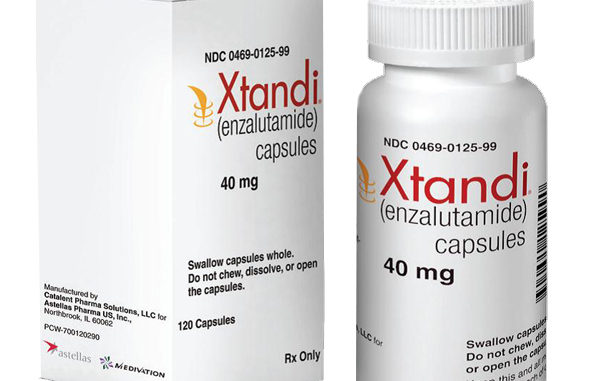
Pfizer and Astellas Announce Top-Line Results from Phase 4 PLATO Trial of XTANDI® (enzalutamide) Capsules in Patients with Metastatic Castration-Resistant Prostate Cancer
“Current and emerging treatments in the management of castration-resistant prostate cancer.”
“Current and emerging treatments in the management of castration-resistant prostate cancer.”
Pfizer Inc. (NYSE:PFE) and Astellas Pharma Inc. (TSE:4503) today announced the Phase 4 PLATO study, evaluating the efficacy and safety of continued treatment with XTANDI® (enzalutamide), plus abiraterone acetate and prednisone as compared to treatment with abiraterone acetate and prednisone alone, did not meet its primary endpoint of improvement in progression-free survival (PFS) in patients with chemotherapy-naïve metastatic castration-resistant prostate cancer (CRPC) whose prostate-specific antigen (PSA) has previously progressed on XTANDI.
“While the PLATO trial did not meet its primary endpoint, it is critical that we continue to focus on addressing the unmet needs of men with metastatic CRPC, who have a poor prognosis despite treatment advances,” said Mohammad Hirmand, M.D., interim chief medical officer at Medivation, Inc., which is now part of Pfizer. “We will continue to analyze these data to better understand the results with the goal of further helping these patients.”
understand the results with the goal of further helping these patients.”
“XTANDI continues to remain an important treatment option for men with metastatic CRPC and their physicians. We are committed to continuing to explore the clinical potential of XTANDI across the disease continuum,” said Steven Benner, M.D., senior vice president, therapeutic area head for oncology development, Astellas.
XTANDI is approved by the U.S. Food and Drug Administration for the treatment of patients with metastatic castrate-resistant prostate cancer (CRPC), based on clinical studies showing statistically significant overall survival benefit versus placebo.
About PLATO
The Phase 4 PLATO trial (NCT01995513) is a global randomized, double-blind, placebo-controlled, two-period study designed to evaluate the efficacy and safety of continued treatment with XTANDI plus abiraterone acetate and prednisone at the time of confirmed PSA progression, as compared to treatment with abiraterone acetate and prednisone alone at the time of PSA progression. The study enrolled 509 patients with chemotherapy-naïve metastatic CRPC who received open label XTANDI during period 1 of the study, until PSA progression was confirmed. Eligible patients were then randomized to one of the two treatments and assessed for the primary endpoint of the study, PFS, defined by either: 1) radiographic progression or 2) unequivocal clinical progression or 3) death during the study.
Period 1 patients were treated with XTANDI 160mg/day orally and period 2 patients were treated with blinded XTANDI 160 mg/day orally in combination with abiraterone at a dose of 1,000 mg/day administered orally and prednisone at a dose of 5 mg administered orally twice daily, versus placebo plus the same doses of abiraterone acetate and prednisone.
For additional information regarding the PLATO trial, visit clinicaltrials.gov(link is external).
About Metastatic Castration-Resistant Prostate Cancer (CRPC)
Metastatic castration-resistant prostate cancer (CRPC) refers to prostate cancer that has spread to parts of the body other than the prostate, and continues to spread despite treatment.1 Up to 40 percent of men diagnosed with prostate cancer who undergo therapy develop metastatic, or advanced, prostate cancer.2 In the U.S., the five-year relative survival rate for prostate cancer patients with metastatic disease is 28 percent, compared with 100 percent for prostate cancer patients with non-metastatic disease.3
About XTANDI® (enzalutamide) capsules
XTANDI (enzalutamide) is an androgen receptor inhibitor that blocks multiple steps in the androgen receptor signaling pathway within the tumor cell. In preclinical studies, enzalutamide has been shown to competitively inhibit androgen binding to androgen receptors, and inhibit androgen receptor nuclear translocation and interaction with DNA. The clinical significance of this mechanism of action (MOA) is unknown.
XTANDI is approved by the U.S. Food and Drug Administration for the treatment of patients with metastatic castration-resistant prostate cancer (mCRPC).
1 Cancer.net. Treatment of Metastatic Castration-Resistant Prostate Cancer. http://www.cancer.net/research-and-advocacy/asco-care-and-treatment-recommendations-patients/treatment-metastatic-castration-resistant-prostate-cancer(link is external). Accessed 12-14-2016.
2 “Current and emerging treatments in the management of castration-resistant prostate cancer.” David Shapiro and Basir Tareen. Expert Rev Anticancer Ther. 2012;12(7):951-964.
3 National Cancer Institute. SEER Cancer Statistics Factsheets: Prostate Cancer. Available at seer.cancer.gov/statfacts/html/prost.html. Accessed 12-14-2016.







Leave a Reply